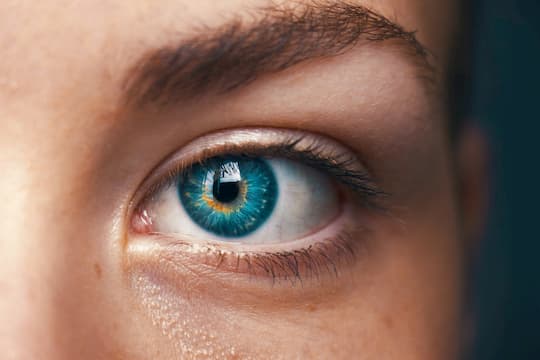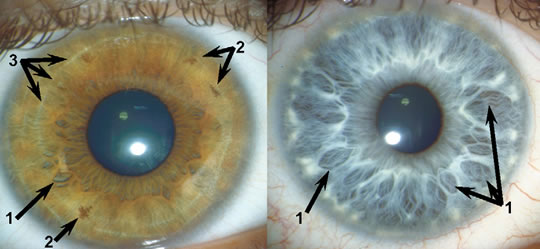Dilated pupils can reveal how hard we’re thinking, how excited or disgusted we are, whether we’re interested and more…
Our pupils, the black holes which let light into the eyes, don’t just help us see, dilated pupils can also signal what’s going on in our minds.
Here are 10 pieces of psychological research which show how dilated pupils reveal many aspects of thought.
1. Dilated pupils mean I’m thinking hard
Look into my eyes and ask me to name the cigar-smoking founder of psychoanalysis and you won’t see much change in my pupil size.
The name Sigmund Freud comes easily to my lips.
But ask me to explain the laws of cricket and watch my dilated pupils.
That’s because research has shown that the harder your brain works, the more your pupils dilate.
When Hess and Polt (1964) gave participants more and more difficult tasks to complete, their pupils got bigger and bigger.
2. My brain is overloaded
Keep watching my eyes closely and you’ll spot the point when explaining the laws of cricket gets too much.
Poock (1973) reported that when participants’ minds were loaded to 125 percent of their capacity, their pupils constricted.
It’ll be trying to explain a googly that will do it. (Don’t ask).
3. Dilated pupils and brain damage
The reason doctors and paramedics flash a light in patients’ eyes is to check their brains are working normally (and because it’s such an easy test to do).
They use the acronym PERRL: the Pupils should be Equal, Round and Reactive to Light.
If my brain is broken, say, because I’ve had a bump on the noggin, you won’t see PERRL.
There may well be other extremely subtle clues, like the blood pouring from my head.
4. You’re holding my interest
Dilated pupils can also signal whether I’m interested in what you’re saying.
White and Maltzman (1977) had participants listening to excerpts from three books: one was erotic, another involved mutilation while a third was neutral.
Their pupils widened at first for all three. But they only remained wide for the passages that were erotic or involved mutilation.
I’m likely to be interested in anything new, so my pupils will dilate a bit at first, but they’ll only stay dilated if I continue to be interested.
5. You’re turning me on
If things take a sexual turn then our eyes are also involved.
Both men and women’s get dilated pupils when they are sexually aroused (e.g. Bernick et al., 1971).
However, not everyone agrees dilated pupils are a signal of sexual arousal.
It tends to get tested by showing nude pictures to people and some argue that we’re just really interested in the nude form.
6. Dilated pupils and disgust
Just as I have dilated pupils when I’m interested or turned on, so they constrict when I’m disgusted.
Hess (1972) showed people pictures of injured children.
First people’s pupils dilated because of the shock and then they constricted to try and avoid the troubling images.
7. Whether I’m liberal or conservative
Should you happen to be carrying around pictures of politicians you might be able to work out whether I’m a liberal or a conservative just from my pupil size.
Barlow (1969) showed people pictures of Lyndon Johnson, George Wallace and Martin Luther King, Jr..
The liberals’ pupils dilated when they saw fellow liberals Johnson and King but constricted when they saw conservative Wallace.
Conservatives showed the opposite pattern.
8. I’m in pain
If you’ve had enough of this article now and want to cause me some pain in return, then why not stab me with a pencil?
If you’re watching closely you’ll see my pupils dilate.
Chapman et al. (1999) fired small electric shocks into people’s fingertips and measured how much their pupils dilated.
At maximum intensity the pupils dilated by about 0.2mm.
But that was only to a relatively tame current.
Imagine what you could do to my pupils if you plugged me into the mains.
9. I’m on drugs
…and you can narrow down the type by looking at my pupils.
Some drugs, like alcohol and opioids cause the pupils to constrict.
Others, like amphetamine, cocaine, LSD and mescaline cause dilated pupils.
Police officers know this and some use it as one way of checking if someone is off their face.
They generally look for dilated pupils to either less than 3mm or dilated to more than 6.5mm (Richman et al. 2004).
10. My personality
This one is not strictly related to pupil dilation, but it’s too good to leave out.
If you look closely at the coloured part of my eye, the iris, you might even get some clues as to my personality (Larsson et al., 2007).
Look closely for ‘crypts’ in my eyes (lines going away from the iris, labelled 1 above) and this suggests I’m a warm, tender-minded person. If you see furrows (labelled 3 above), then, watch out, I’m impulsive.
It seems that the same gene, Pax6, which affects part of the brain associated with approach-related behaviours (the left anterior cingulate cortex, if you really want to know) also induces tissue deficiencies in the iris.
Dilated pupils
As you’ll have noticed, the same pupil response can mean different things, although generally dilated pupils send a positive message and when they constrict it’s a negative one.
But exactly what it means depends on the situation (and whether someone has turned on a light).
This is all good fun to know, but can we really detect these tiny changes in people’s pupil size?
According to an fMRI imaging study, change in pupil size may be difficult for us to notice consciously, but we do seem to pick up on these very small changes unconsciously (Demos et al., 2008).
So changes in pupil size may be experienced, along with other verbal and nonverbal signals, as a gut instinct to either approach someone or run like hell.
Whether or not the eyes are windows to the soul, the pupils are certainly windows to the mind.
Image credit: Larsson et al. (2007)


